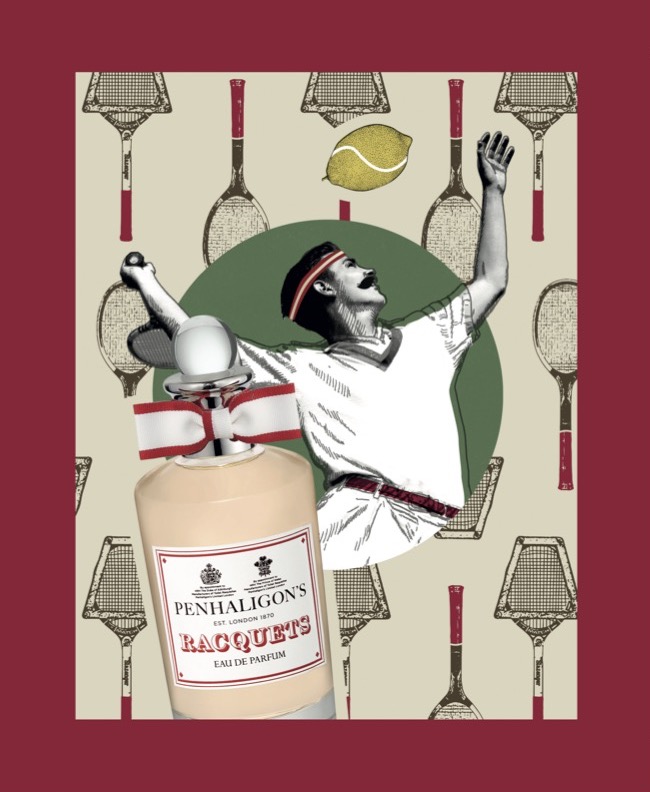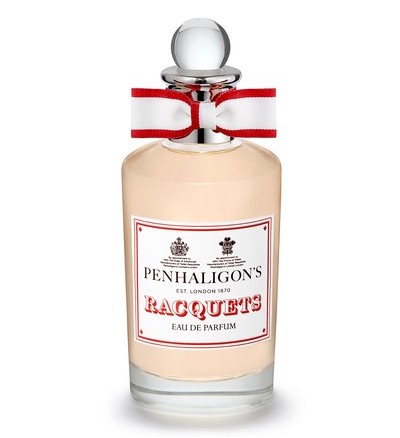By Horacio Silva
As former champions, from Björn Borg to Boris Becker and Andy Murray, will attest, not every return to the tour plays out like an inspiring post-script for the ages. But some second acts are destined for greatness. Take the reissuing of RACQUETS, the tennis-inspired fragrance by Penhaligon’s, perfumer of the modern English gentleman. Released in 1989 and retired in the early 2000s, RACQUETS has been reimagined for contemporary noses by Fabrice Pellegrin, a Roger Federer among perfumers, and the result is a winning formula that’s as crisp as Wimbledon whites and complex as the mind of a champion.
A handsome blend of lemon essences that comes out swinging with the unbridled zeal of a rookie before settling into a mature presence of woody and leathery notes, it suggests nothing as infra dig as physical exertion. “Perspiration is terribly uncouth,” says Penhaligon’s chief executive, Lance Patterson. “At Penhaligon’s it’s all about tipsy tennis.” He is joking, of course (if not, somebody give the man a drink), but it’s not hard to imagine RACQUETS appealing to the sort of tennis enthusiast whose idea of refreshments extends beyond Robinsons Lemon Barley. This is a fragrance designed to be worn in the good seats while spectating the heat of battle. Or, as Chandler Burr, the former New York Times perfume critic and author of The Emperor of Scent, tells Racquet: “It’s a high-speed photograph of a hushed Wimbledon crowd under a crisp blue sky.”
Inspired by the spirit of the game, a tennis of the imagination replete with evocative scent associations (citrus-based cocktails! freshly manicured grass!), Pellegrin has created a fragrance that is as synonymous with English tennis as strawberries and cream—or sunburn and disappointment, if the gods of SW19 are playing sport with Blighty’s hopes. “The idea was to marry a tennis tournament and the concept of the racquets themselves,” Pellegrin explains, adding how the fragrance’s leathery notes were originally indebted to the equestrian world. “As I imagined the leather racquets, I reworked my creation over time.”
As the embodiment of English sportif glamour and clubby gentlemanly refinement, RACQUETS reenters the arena at a time when classic Anglophilic tributes like The Crown rule the culture, even post-colonial takes like Bridgerton rip at the bodice of our imagination, and British high fashion once again commands global attention. It’s little wonder that Penhaligon’s, which speaks in a plummier English accent than Stephen Fry, is enjoying another Summer in the sun.
That fine fragrances are part of the canon of masculine connoisseurship, alongside cars and cigars, is in no small part due to Penhaligon’s. Founded in 1870 by William Penhaligon, a barber from Penzance who moved to London and hung out his shingle at St James Street and Jermyn Street after working on Piccadilly Circus, Penhaligon’s is a mainstay of British luxury. As resolute as a London leasehold, its lotions and potions have been favored by potentates from Winston Churchill (a fan of Blenheim Bouquet, the fragrance created for his grandfather, the Duke of Marlborough) to the Shah of Persia.
Since being granted its first Royal Warrant from Queen Alexandra in 1903, the company has stuck to the royal family like Corgi hairs, having subsequently been awarded Warrants from the Duke of Edinburgh in 1956, and the Prince of Wales in 1988. Though the company is famously tight-lipped about its clients, court gossips whisper that Prince Charles has a hair pomade made exclusively for him.
Not surprisingly, given that the rise of the brand coincided with the advent of the egoiste-as-saloniste, a moment in time when scent aesthetes like Stephen Tennant refused to enter a room before it had been spritzed with his signature trail, the brand has also been catnip for literary dandies such as Oscar Wilde. The great wit was famously enamored of Hammam Bouquet, the company’s oldest fragrance, inspired by the fragrant Turkish baths of Mayfair where a striving William Penhaligon once took his ease.
Equally enchanted by Penhaligon’s was the Italian aristocrat, film director and style icon Luchino Visconti, himself something of a connoisseur of sybaritic accoutrements. “I loved the way he smelled,” his former partner, the late opera and film director Franco Zeffirelli told me a few years before his death in 2019, practically swooning. In fact, Zeffirelli was so dazzled by Visconti’s fragrance, also Hammam Bouquet, that he bought the company in 1975.
Penhaligon’s has since been collected by the European fragrance powerhouse Puig, but the list of celebrities and influencers drawn to the company continues unabated, including Tom Ford, Stella McCartney and Kate Moss. Like all conspicuously inconspicuous trendsetters, they’re no doubt drawn in part by the company’s seeming allergy to bombast and hype, to say nothing of its unimpeachable provenance.
Though everything about the brand—from its locations at London addresses Nancy Mitford would have recognized as “U,” to the grosgrain ribbons and signature glass bottles with stoppers—is redolent of old-money elegance, it is not tethered to the past. In fact, modernity has always been one of the secret ingredients in its recipe for success. The company was among the first in the capital to introduce electricity in their stores, and more recently they have been pioneers in newfangled breakthroughs such as C02 extraction and nature print technology. As Burr, the perfume critic, says of RACQUETS: “This is a relentlessly contemporary work…the London of the Shard, its bitter citrus edges nicely twisted with traces of sweet fructose. It’s young and has a sense of humor.”
Regardless of what the ineluctable forces of fashion may augur, it’s a safe bet that the essence of Penhaligon’s is not changing anytime soon. As Lance Patterson says, “Elegance is a precious thing both on and off the court.”
In partnership with Penhaligon’s, British perfumers est. 1870.
One needn’t even exert themselves.
Lemon rebounds off grass, strapping
leather doubles up with our champion
wood. A fragrance that’s certainly
one to love.




